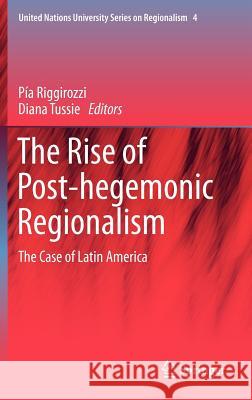The Rise of Post-Hegemonic Regionalism: The Case of Latin America » książka
The Rise of Post-Hegemonic Regionalism: The Case of Latin America
ISBN-13: 9789400726932 / Angielski / Twarda / 2012 / 194 str.
The Rise of Post-Hegemonic Regionalism: The Case of Latin America
ISBN-13: 9789400726932 / Angielski / Twarda / 2012 / 194 str.
(netto: 383,36 VAT: 5%)
Najniższa cena z 30 dni: 385,52
ok. 22 dni roboczych.
Darmowa dostawa!
The focus of this edited volume is twofold: to better understand current regional transformations; and to discuss what new developments mean for how we theorize non-European regionalism and regionalist governance. The book provides an original and grounded analysis of post-hegemonic and post-trade arrangements in the areas of finance, security, development and civil society. By observing these points the authors hope to open a new space for an analysis of the transformative capacity and the political resilience of new regional spaces and institutional arrangements. Theoretically, by focusing on the question of post-trade regional governance we hope to challenge New Regionalist approaches that have usefully embraced issues beyond mainstream EU studies (in particular the links between the regional, the international and the local), yet had assumed regionalism as taking place within and modelled by neoliberal economics. The approach taken here supersedes the old categorizations of 'old' and 'new' regionalism to explain new realities that are not taking place within and modelled by neoliberal economics. The chapters will contribute to the analytical field of (comparative) regionalism by addressing new questions about how transformative post-hegemonic regionalism(s) are in terms of regional space and new polities. Finally, the collection is an open invitation to engage EU and other studies on regionalism as Latin America matters for the knowledge it can provide on pressing questions such as flexibility, the use of informal politics and power, and the continuing widening-versus-deepening debate understanding regionalism and regionalization for other regions of the world."
This book offers a timely analysis, and a novel and nuanced argument about post-neoliberal models of regional governance in non-European contexts. It provides the first in-depth, empirically-driven analysis of current models of regional governance in Latin America that emerged out of the crisis of liberalism in the region. It contributes to comparative studies of the contemporary global political economy as it advances current literature on the topic by analysing distinctive, overlapping and conflicting trajectories of regionalism in Latin America. The book critically explores models of transformative regionalism and specific dimensions articulating those models beyond neoliberal consensus-building. As such it contests the overstated case of integration as converging towards global capitalism. It provides an analytical framework that not only examines the 'what, how, who and why' in the emergence of a specific form of regionalism but sets the ground for addressing two relevant questions that will push the study of regionalism further: What factors enable or constrain how transformative a given regionalism is (or can be) with respect to the powers and policies of states encompassed by it? and: What factors govern how resilient a given regionalism is likely to be under changing political and economic conditions? §











